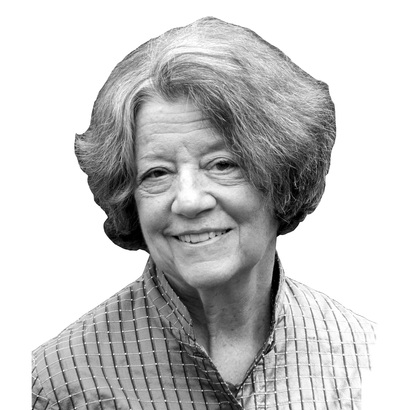As the author of the first comprehensive biography published since Ella Fitzgerald’s death, in 1996, I am indebted to the 21st-century sources that helped me to change the narrative of her life from that of a shy, passive singer controlled by her managers to an original artist with a sense of mission to further “social harmony” and express her versatility to the fullest.
I benefited from YouTube posts of Fitzgerald’s live TV appearances from Europe. I avidly read many Black newspapers, recently digitized and searchable, from around the country—a gold mine. I copied hundreds of pages from the singer’s archive at the Smithsonian National Museum of American History, including her address book and canceled checks. I talked to family and friends who knew both the artist and the woman.
One unique privately held document that has meant so much to me over these past 10 years was an unexpected gift—a treasure entrusted to me by Ella Fitzgerald’s son, Ray Brown Jr. In 2014, he sent me his mother’s scrapbook by mail. He was relocating, and he needed safe storage for this and other items.
I couldn’t believe what I was holding in my hands: her only (to the best of my knowledge) surviving scrapbook, which at first glance covered three crucial years, 1936 to 1938, when a 17-year-old amateur weed bloomed into a honeysuckle rose. The scrapbook had an embossed brown cover followed by 25 yellowed pages bound together by black string, some filled with fragile, often undated clippings, threatening to shred from a single touch.
I saw her penmanship in ink titling different categories, the first called “paper clippings,” including one from the Pittsburgh Courier of an interview: Ella Fitzgerald’s Hardest Job Was to Get Folks to Listen. She saved notices from pioneering jazz magazines written by white critics, including DownBeat’s review of a record she made with Benny Goodman (“Goodnight My Love”).
Page x was titled “Fan Mail.” After that, she pasted in many random, undated newspaper clippings, as well as a section for her collection of autographed studio photos from prominent vaudeville stars and show business figures, some famous, some obscure.
Front and center in the scrapbook was Chick Webb, Ella’s first boss, who led a great swing band at the Savoy Ballroom in Harlem. He hired her in 1935, when she was 18 years old. Webb had initially said, “I don’t want no girl singer.”

Newspaper clippings on page i exposed a little-known controversy: Benny Goodman Offers $5,000 For Ella’s Contract, But Chick Webb Says “No Sale.” Another clip on the same page marked the arrival of “Chick and Ella” at the Loew’s State Theater, a movie palace in Midtown Manhattan frequented mainly by white people. They had “jumped the fence,” said a band member, in the Jim Crow era.
One clip of a record review from Metronome predicted Fitzgerald’s hit on Billboard’s Hit Parade with the novelty “Mr. Paganini,” then titled “If You Can’t Swing It (You Have to Sing It).” She was still singing it 50 years later.
Fitzgerald’s autographed photos of stars such as the comic Pigmeat Markham and the brilliant “jive” innovator Cab Calloway, as well as a newspaper clip showing her with the pioneering Jackie “Moms” Mabley, provoked my curiosity about the understudied renaissance of Black vaudeville in the 1930s. I would later realize why Fitzgerald impersonated Louis Armstrong as part of her act in her big hit “Mack the Knife,” enshrined in her famous 1960 live album from Berlin. If she took pleasure in delivering occasional one-liner asides as if she, too, did stand-up, it is because she had great teachers.
Through the scrapbook I embraced my subject and tempered my anxiety about challenging stereotypes that confined this great artist through predictable tropes. That young Ella was the shy amateur coaxed into singing at the Apollo Theater in 1934. My young Ella was ambitious and proud of her rising star. She wanted success; she wanted approval. She acknowledged her competition. She had purpose.
Now, all these years later, it’s time for the scrapbook to leave my care. Where will it end up? It’s not my decision, but I know regret will blend with relief. There will be a place, a proper home for it, somewhere, and it will inspire others to ask different questions and offer different answers.

Judith Tick’s Becoming Ella Fitzgerald: The Jazz Singer Who Transformed American Song is out now from Norton


